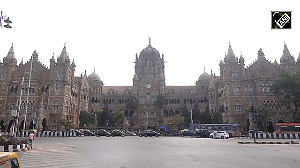Question: what's black and white, lives in an orange egg and has recently started talking in Hindi and other Indian languages, after years of being an English-speaking bird?
Answer: Penguin.
Okay, that's facetious, so here's another question: why would a company with decades of experience in English publishing spread its wings to move outside its area of expertise and print titles in Indian languages?
Ravi Singh, publisher, Penguin Books India, has a straightforward answer. "We have been aware for a long time that there is great writing in other Indian languages, which simply doesn't have a big enough outlet," he says. "As far as we are concerned, getting into local-language publishing brings a touch of completeness to Penguin's India operations."
The decision to publish in Indian languages -- Hindi and Marathi to start with, Malayalam and Tamil to follow -- is a momentous one for the company. Barring a few one-offs -- a Penguin USA book that was printed simultaneously in English and Spanish, for instance -- this marks the first time Penguin is publishing in languages other than English.
Which makes it all the more remarkable that Penguin India got immediate support from its parent company: John Makinson, chairman and CEO of the Penguin Group worldwide, was present at the recent launch of the first four Hindi titles in Delhi, even though half the speeches were made in a language he wasn't conversant with.
Singh cautions that the company isn't going to move too fast with its new venture. "We will focus on Hindi, Marathi and Malayalam titles this year, and probably start Tamil publishing in 2006," he says.
"There are no immediate plans to enter other Indian languages, though we are open to the idea of one-off publications that are relevant to a particular region."
In each language, there will be a mix of original titles and translations of successful English titles. The eventual aim is to have a 50-50 mix but for the first couple of years translations will outweigh original titles.
The company will also consider international publications for translation, though as Singh points out, this will have to be done selectively: "A Da Vinci Code, for example, will probably not work in Hindi."
Naturally, the move will entail a few changes in the company's operations. Penguin is working in association with a new company, Yatra Books, which is where the editorial work will be done, with specially hired guest editors sourcing and approving titles.
The company will also have to make its distribution network wider, since the local-language titles will be aimed not only at urban buyers but readers in smaller towns too.
"We have to prepare for increasing competition," says Singh, "since in the next few years a number of book chains will be spreading their branches across the country."
What are the major challenges in the new field? "It's important for us to get a sense of the literary world in the other languages," says Singh.
"It's a different world and we have to work closely with people who know those markets well. There are little differences -- payment terms are not very evolved, for instance. Also, it's a much broader stratum, since we'll be catering both to cosmopolitan readers and those from the lower-middle class. Sensibilities vary and one strategy isn't going to work for all customers."
Penguin in Hindi
What's available now
-
Penguin has launched four Hindi titles to start with:
-
Hamara Hissa: an anthology of contemporary Hindi stories edited by Arun Prakash
-
Paradise and Other Stories by Khushwant Singh, translated as Jannat aur Anya Kahaniyan
-
A translation of Anita Nair's Ladies Coupe
-
Namita Gokhale's new novel Shakuntala: The Play of Memory, translated as Shakuntala: Smriti Jaal. Interestingly, this book is being published simultaneously in English and Hindi; Gokhale finished the original in English and then worked with a translator for the Hindi version. "In fact, the Hindi one was ready first!" says Ravi Singh.








 © 2025
© 2025